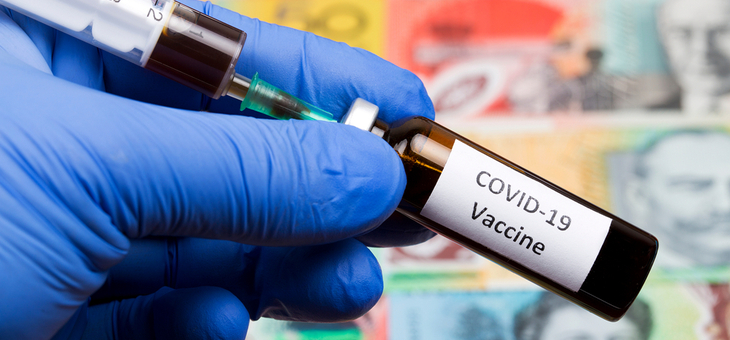While Australia is no longer last among OECD countries for our vaccination rate (we were 36th of 38 countries as of Wednesday morning), we are still a long way short of the gold medal Prime Minister Scott Morrison has suggested we should be aiming for.
Federal Labor has proposed a solution to this problem, but the government has already criticised it as “insulting”.
Opposition leader Anthony Albanese wants fully vaccinated Australians to receive a one-off cash payment of $300 to encourage greater vaccine take-up across the country.
The proposal would see the payment go to every Australian citizen who was fully vaccinated by 1 December.
Read: Why Sydney’s lockdown is likely to be extended again
Labor said that the government had guaranteed Australia would have more than enough doses vaccines to meet the 80 per cent target by 1 December.
Mr Albanese told the ABC that just like other ALP suggestions last year that were quickly shut down by the government, they eventually came to their senses and implemented these policies.
“The government should adopt this,” Mr Albanese said. “We put forward wage subsidies last year and the government said it was a dangerous idea at the time, until the queues formed outside the front of Centrelink offices. Then they came on board.
“This is a practical suggestion. It’s constructive. The chief medical officer, Dr [Paul] Kelly, said earlier this year that we need to provide every incentive possible for people to be vaccinated.
“We know that Australia at this stage is running pretty close to last in the developed world when it comes to the rollout of this vaccine.”
Read: Worries about COVID ‘blind spot’
Mr Albanese said that if 100 per cent of Australians were to get vaccinated his plan would cost $6 billion, and that if around 80 per cent of the population chose to get vaccinated his plan would cost $5 billion.
He explained that this was a good investment given that lockdowns were costing Australia up to $2 billion each and every week.
Mr Albanese also said that the $300 incentive payments would have the dual effect of boosting economic activity.
Read: Vaccine rollout faces further delays
“You give $300 cash payments to Australians, they will spend it, creating and supporting jobs in their local communities, supporting economic activity,” Mr Albanese said.
“This is just one measure. But it is a measure as well that will support jobs and economic activity. There is no downside here. And the government should take this on board and should adopt it.
“These payments will deliver significant cash stimulus for businesses who have paid the price for Scott Morrison’s failures on vaccines and quarantine for the past 18 months.
“When Australia’s COVID response relied on Australians doing the right thing, our country was leading the world. Now that Australians are relying on Scott Morrison to do his job and roll out the vaccines, we are coming last in the developed world.”
Federal finance minister Simon Birmingham rubbished Labor’s $300 vaccination proposal, telling ABC News Breakfast that the plan was “insulting” and completely unnecessary.
“We have looked at it, and the evidence says it is unnecessary and unlikely to work,” Mr Birmingham said.
“It is clearly unnecessary in the sense that Australians are responding. They do want to get their vaccines and, frankly, it’s a little bit insulting to the millions of Australians who (are) already doing the right thing.
“If you look at countries like the UK and Canada who have pushed past the 80 per cent mark in terms of first doses in those countries, right across their adult population, they have used some targeted incentives in careful, targeted ways to help get people over the line, but not this type of broad-brush scattergun approach.”
NSW recorded 199 new COVID cases on Wednesday, Queensland recorded 16 and Victoria recorded four (although all of those were linked to known outbreaks and quarantining for their entire infectious period).
NSW Premier Gladys Berejiklian said that by the end of August she would like her state to have recorded around six million jabs.
“Six million jabs is roughly half the population with at least one or two doses,” Ms Berejiklian said. “That gives us additional options as to what life looks like on 29 August.
“We’re at 3.9 million. I suspect we will be at four million by the end of the week or in the next few days and that’s a target I would like to set for New South Wales. And I am really urging everybody to come forward, to listen to the health advice.”
Ms Berejiklian also admitted that her government was looking at offering vaccination incentives to help bolster the rollout, but that these were likely to revolve around freedom of movement rather than financial incentives.
“We know if we encourage people to get vaccinated to provide them with additional freedoms that that is the best motivator of all,” Ms Berejiklian said. “Obviously we are considering all the options.
“We believe, based on experience overseas and elsewhere, that allowing people additional movement or activity if they have been vaccinated, we think is a great incentive and that will be linked to our plan for what life looks like on 29 August.”
Queensland chief health officer Dr Jeanette Young said the vaccination rate in the state was good, with 18.47 per cent of Queenslanders fully vaccinated and 36.97 per cent having received at least their first dose.
Dr Young also explained that Queensland’s current outbreak was large enough that anyone under the age of 60 should speak to their doctor about having the AstraZeneca shot.
Do you think offering cash incentives for vaccination injections is a good idea? Would you like a $300 reward for being fully vaccinated? Why not share your thoughts in the comments section below?
If you enjoy our content, don’t keep it to yourself. Share our free eNews with your friends and encourage them to sign up.

